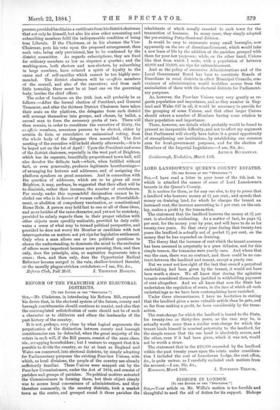REFORM OF THE FRANCHISE AND ELECTORAL DISTRICTS.
[To THE EDITOR OF THE "SPECTATOR ']
Sut,—Mr. Gladstone, in introducing his Reform Bill, expressed his desire that, in the electoral system of the future, county and borough constituencies should continue to coexist, and also that the contemplated redistribution of seats should not be of such s, character as to obliterate and efface the landmarks of the past history of the country.
It is not, perhaps, very clear by what logical arguments the perpetuation of the distinction between county and borough constituencies can be defended, when the great majority of the voters in each will, if the Bill passes, consist of the same class, viz., occupying householders ; but I venture to suggest that it is possible to divide the country, so far at least as England and Wales are concerned, into electoral districts, by simply adopting for Parliamentary purposes the existing Poor-law Unions, with which, as local divisions, the people of the country are already sufficiently familiar. These Unions were mapped out by the Poor-law Commissioners, under the Act of 1834, and consist of parishes and groups of parishes. No political motives actuated the Commissioners in forming them, but their object simply was to secure local convenience of administration, and they therefore commonly, in the country districts, took a market town as the centre, and grouped round it those parishes the inhabitants of which usually resorted to such town for the transaction of business. In many cases, they simply adopted the pre-existing Petty-Sessional division.
It would be easy to enumerate many small boroughs, now apparently on the eve of disenfranchisement, which would take a new lease of life by the addition of the parishes grouped with them for poor-law purposes ; while, on the other hand, Unions like that from which I write, with a population of between 40,000 and 50,000, are ripe for enfranchisement.
And as the policy of successive Administrations and of the Local Government Board has been to constitute Boards of Guardians in rural districts in effect Municipal Councils, con- venience of administration would doubtless accrue from the assimilation of these with the electoral districts for Parliament- ary purposes.
As, however, the Poor-law Unions vary very greatly as re- gards population and importance, and as they number in Eng- land and Wales 647 in all, it would be necessary to provide for the grouping of some Unions, and that other larger Unions should return a number of Members having some relation to their population and importance.
These, however, are details which probably would be found to present no insuperable difficulty, and not to affect my argument that Parliament will shortly have before it a grand opportunity of strengthening our institutions, by establishing one common area for local-government purposes, and for the election of Members of the Imperial Legislature.—I am, Sir, Sm., Guisborough, Yorkshire, March. 151h.
ARTHUR BUCHANNAN.


































 Previous page
Previous page